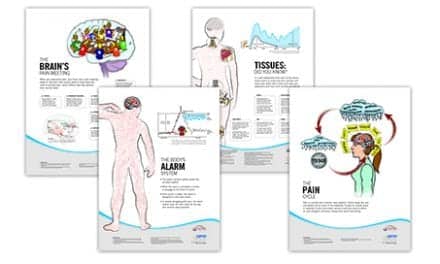A news release issued by the National Institutes of Health (NIH) announces that a recent report indicates an online training module, built for the evaluation and care of chronic pain, “greatly” improved medical student clinical skills. The report appears in the Journal of the American Geriatrics Society. The module, engineered by the University of Pittsburgh, uses an older adult woman with chronic lower back pain as a case study and is reported to be the first curriculum resource created through the efforts of the NIH Pain Consortium’s Center of Excellence in Pain Education program (CoEPEs). The release adds that the program was developed in response to the Affordable Care Act’s mandate to advance the science, research, care and education of pain.
Josephine P. Briggs, MD, director of NIH’s National Center Complementary and Alternative Medicine (NCCAM) and member of the NIH Pain Consortium Executive Committee, designates that management of chronic lower back pain as one of the most common and difficult problems that patients and healthcare providers face.
“The educational materials that have been developed through this partnership will be a great asset in helping the next generation of physicians build clinical skills to support their chronic pain patients,” Briggs adds.
According to the release, the CoEPEs were selected in 2012 to serve as hubs for the development, evaluation, and distribution of pain management curriculum resources of medical, dental, nursing, and pharmacy schools. Additionally, the NIH Pain Consortium developed the centers to improve how healthcare professionals are taught about pain and its treatment.
The module was developed by a team of six experts in education, information technology, pain management, and geriatrics at the University of Pittsburgh. The experts focused on common errors in clinical exams, expert modeling, interactivity, and feedback. The module presents a standardized case of an older adult back pain patient named Edna and features brief video clips depicting her interactions with her clinician. The release notes that the module also features a multiple-choice pre-test, interactive questions, and a multiple-choice post-test.
A total of 27 medical students were reportedly exposed to the module and 28 were not. The students who were exposed to the module performed significantly better on their objective structured clinical examinations, an exam during which medical students rotate through multiple stations, each with an objective examiner, demonstrating clinical skills and knowledge while interviewing real or simulated patients. The results indicate that 93% of the students in the exposed group passed the exam, compared to 60% of the non-exposed group.
Debra K. Wiener, MD, adds that, “While our module focused specifically on an older adult with chronic low back pain, we see this type of educational intervention as a powerful and efficient curriculum tool for a variety of patient scenarios. We look forward to continuing to work with the NIH Pain Consortium in its efforts to improve pain care across the country for many different pain conditions that plague patients of all ages.”
The CoEPE program is coordinated by the National Institute on Drug Abuse (NIDA), one of 27 Institutes and Centers at the National Institutes of Health.
Nora D. Volkow, MD, NIDA director, states that the organization is pleased that the “first successful curriculum product created by the CoEPEs relates to solutions for chronic back pain…a balanced approach that includes a range of pain management options is needed to ensure that people suffering from chronic pain can get the relief they need while minimizing the potential for abuse.”
Photo Credit: NIH
Source: NIH





